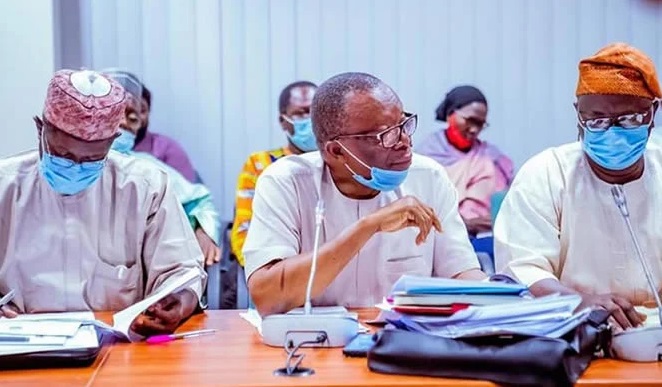EXCITING NEWS: TNG WhatsApp Channel is LIVE…
Subscribe for FREE to get LIVE NEWS UPDATE. Click here to subscribe!
A warning strike commenced by the Academic Staff Union of Universities (ASUU) on February 14, which was supposed to last about four weeks snowballed into an indefinite strike action that commenced on August 29, and has now exceeded 200 days.
ASUU, the umbrella body for public universities in Nigeria, declared the strike over what it termed the Federal Government’s refusal to honour its agreement to implement the Memorandum of Action signed with them in December 2020.
The union maintains that issues such as harmonising the Integrated Personnel Payroll Information System (IPPIS) with the University Transparency Accountability Solution (UTAS), the non-payment of academic earned allowances, and university revitalization, form a critical part of the reasons for the strike.
There are 91 public universities in Nigeria and about 70 of them make up the body called ASUU. A strike of this magnitude has left thousands of students stranded and frustrated as more than 2.1 million students are studying across all public universities, according to the Executive Secretary of the National Universities Commission, Abubakar Rasheed.
In Nigeria, it is believed that the only language the Nigerian government understands is strike and unions use this tool as a last resort to get the attention of authorities to their agitations. According to the comprehensive report, the number of times ASUU has gone on strike in the last 23 years is enough to earn a student a four-year bachelor’s degree in an uninterrupted academic setting.
Annually, the country loses billions of naira through foreign education as a result of these interruptions. The Central Bank of Nigeria (CBN) reported that Nigerians spent $378.77 million on foreign education between January and May 2022 this year and over $29 billion in the last 12 years.
FG, ASUU engage in fruitless meetings
Since the ASUU strike commenced 201 days ago, meetings between the union and the Federal Government have not positively impacted the situation. While the Federal Government claimed it has attended to almost 80 per cent of ASUU’s demands, the latter insists promises are not sufficient grounds to call off the strike and demands implementation of the Memorandum of Action signed in 2020.
“For the avoidance of doubt, however, none of the issues that forced our Union to resume the suspended strike as listed in the December 2020 FGN-ASUU Memorandum of Action (MoA) has been satisfactorily addressed by the Government to date,” ASUU’s president Emmanuel Osodeke stated.
According to him, the draft renegotiated FGN-ASUU Agreement (second draft) remains unsigned, and the UTAS has not been adopted and deployed to replace the discredited IPPIS and the White Papers on Visitation Panels to Federal Universities, which the government said was ready more than six months ago, are nowhere to be found.
Additionally, the union said the government has not released the N30 billion balance of the first tranche of the Revitalization Fund and the outstanding two tranches of the Earned Academic Allowances (EAA) amounting to N25 billion. It said the government has also not reviewed the Law of the National Universities Commission (NUC) to stem the tide of the proliferation of universities.
The union maintains that the strike is aimed at saving public education from the misfortunes that have befallen Nigeria’s public primary and secondary schools, by ensuring that Governments (Federal and State) commit strongly to supporting quality public university education.
Some universities withdraw from the ASUU strike
Several universities that had joined the ongoing strike embarked upon by ASUU are gradually pulling out. Some of them include Kaduna State University (KASU), Ambrose Alli University in Edo State, the Ekiti State University (EKSU), Ado Ekiti, the Lagos State University (LASU), and the Delta State University (DELSU).
Three other public universities not observing the strike action are Kwara State University (KWASU), Kogi State University (KSU), and Osun State University (UniOsun). KWASU is dealing with an internal crisis and UniOsun was suspended by ASUU, but both institutions have expressed support for the strike; while the Governor of Kogi State, Yahaya Bello proscribed the ASUU-KSU chapter since July 2017.
The Usmanu Danfodiyo University, Sokoto (formerly the University of Sokoto) is also considering opting out of the prolonged strike embarked upon by ASUU, in the interest of their students.
A source at the university said given the lack of commitment expressed by the federal government, it was considering the option of localizing the struggle, by approaching the state government with its demands.
Meanwhile, the Committee of Pro-Chancellors of State-owned Universities (COPSUN) has condemned ASUU’s unpopular approach to the issue of funding tertiary education in a modern globalised world, describing its strike action as ‘archaic, antiquated, and impracticable.’
The secretary of the committee Marcus Awobifa, said in a statement, that “this is an auspicious time for ASUU to creatively work with all stakeholders to tinker out a compromise that will bring back to the campuses the young men and women who have been insensitively thrown out of the universities for the last six months”.
FG to meet with Pro-Chancellors, VCs, and Chairmen of University Governing Councils
The National Universities Commission (NUC) has invited pro-chancellors, vice-chancellors, and chairmen of governing councils of federal universities to a meeting with the Minister of Education in Abuja on Tuesday, September 6, as part of efforts to resolve the ongoing strike.
In the invitation letter signed by its Deputy Executive Secretary (Administration), Chris J. Maiyaki, the NUC said it had become necessary for the governing councils and the management of the universities to be briefed on the decisions and actions taken by the Federal Government so far to allow for a well-coordinated review of the situation including building consensus around succeeding actions.
It is hoped that the meeting will chart a new course for funding public universities in the country, but whether it will compel ASUU to call off its almost seven months strike without the government implementing the Memorandum of Action it signed in 2020, remains to be seen.
